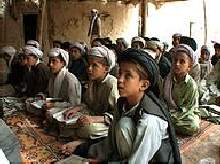Posted without comment except to say this was published in an American newspaper whereas it reads like the Yemen Times.
The Islamic leaders of Osama bin Ladenâs ancestral homeland have come up with a unique solution to fighting terrorism -- release 246 jailed suspects, put some on the army payroll and use millions of dollars to pay off tribes that sheltered them.
| Hmmm... Paying Danegeld. Now, why didn't I think of that? |
The freed inmates arenât required to work, but are kept under surveillance instead after repenting to a senior cleric picked by President Ali Abdullah Saleh, officials said. The amnesty experiment is one of the more unusual measures Yemen has taken since the USS Cole bombing killed 17 U.S. sailors off the port of Aden in October 2000, nearly a year before the Sept. 11, 2001, attacks.
| Seems to me 17 of our guys are still dead. If they repent can they live the rest of their lives? |
Yemen also is working with the United States and Saudi Arabia to close borders and ports to arms smuggling and militant traffic. But critics say the moves arenât enough to wipe out terrorism in a country where poverty, extremism, corruption and nepotism are rampant and American policies on Iraq and the Palestinians are ceaselessly exploited not popular with the public or clerics. "The feeling of hatred for Americans is increasing day after day and this represents a huge obstacle to improving relations further with America," said Mohammed al-Sabri, a freelance columnist who focuses on Yemeni-U.S. relations. In an interview, Prime Minister Abdul-Kader Bajammal said Yemen has dismantled 90 percent of terror cells since the Sept. 11 attacks, while 20 to 25 of the most hard-core wanted men remain at large. There hasnât been a major terrorist act inside the country since three American missionaries were shot dead at a Southern Baptist missionary hospital in the southern town of Jibla in 2002. Still, some religious leaders arenât helping, and exporting terrorism from Yemen -- whether to Iraq or elsewhere -- remains a thriving industry concern.
| Probably Saleh sees that problem as a method of getting the Bad Guys out from under foot... |
When President Saleh asked senior clerics in August 2002 to initiate a dialogue with the jailed suspects, all but one balked. Unlike his colleagues, Supreme Court Judge Hammoud al-Hitar, who also is a senior cleric, wasnât concerned about being labeled a U.S. agent for cajoling the Muslim radicals into repenting and pursuing a more moderate religious path. The effort led to the release of 246 inmates -- not one of whom has lapsed to his old ways, al-Hitar says.
| See, all they needed was a good talking to. |
About 65 suspects remain in prison, including those indicted for terrorist acts. Al-Hitar recently went to London to talk to British security officials about his experience. Sitting on his living room floor, al-Hitar told AP he began his talks with the most dedicated al-Qaida recruits, holding "tough" sessions. He said he went through all their arguments for militancy -- that jihad, or holy war, means attacking others and that the spilling of the blood of non-Muslims is legitimate -- and proved to them that the Quran considers their beliefs wrong. After repeated sessions, the inmates were released in three stages, according to al-Hitar, who said he is "100 percent sure they repented out of conviction and not because they wanted to get out of jail."
| Even though having "repented" means there's no one hitting them regularly... |
He said the men have been told they are under surveillance and since their release no infractions have been reported. Abdul-Karim al-Iryani, a former prime minister who is an adviser to the president, said that in many cases poverty was the reason the men joined al-Qaida. To improve their situation, the government gave some of the freed men army titles and salaries. "But they donât report to work," al-Iryani said. "Itâs a source of security to the country. The biggest social welfare system in the country are the army and the police." In subduing al-Qaida, Prime Minister Bajammal said the government also bought off tribes that once sheltered terrorists. Yemen paid them millions of dollars, said al-Iryani.
| I'd comment "wotta racket," but I'm speechless... |
|
 The government dispatched more helicopter-born troops on Wednesday to encircle a rugged mountain hideout and cut off water deliveries to the region where a reneged tribe is holding five Italian tourists hostage. The Associated Press saw dozens of soldiers emerge from helicopters in the Jahan area of Marib province, near where security officials say the kidnappers are holed up with their captives. Other helicopters could be seen flying low through the mountains, apparently trying to spot the tribesmen.
The government dispatched more helicopter-born troops on Wednesday to encircle a rugged mountain hideout and cut off water deliveries to the region where a reneged tribe is holding five Italian tourists hostage. The Associated Press saw dozens of soldiers emerge from helicopters in the Jahan area of Marib province, near where security officials say the kidnappers are holed up with their captives. Other helicopters could be seen flying low through the mountains, apparently trying to spot the tribesmen. 
 Underground religious schools that promote extremist forms of Islam are drawing more than 300,000 young students across Yemen, the country's prime minister said Saturday. Prime Minister
Underground religious schools that promote extremist forms of Islam are drawing more than 300,000 young students across Yemen, the country's prime minister said Saturday. Prime Minister